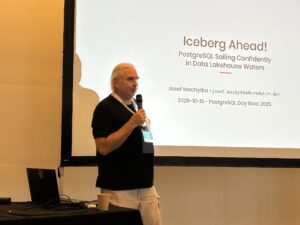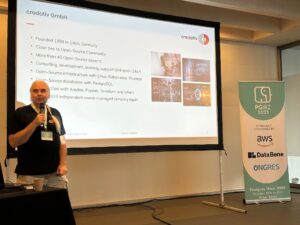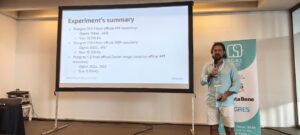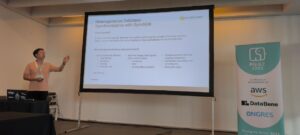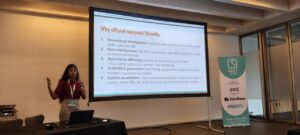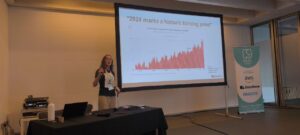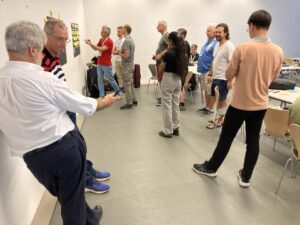Sun, Sea, and SQL: Highlights from Postgres Ibiza 2025
| Categories: | credativ® Inside |
|---|
Postgres Ibiza 2025 took place on October 15–17, 2025, at the Palacio de Congresos de Ibiza on the beautiful island of Ibiza in the Mediterranean Sea. The conference is organized by the Spanish non‑profit Fundación PostgreSQL and aims to be a “refreshing, open and diverse Postgres conference” in a “truly unique environment.” And sure enough, the event is intentionally remarkable, organizers curate talks on cutting‑edge topics. The conference spans three days: the first two are devoted to scheduled talks, and the last day is an “unconference workshop day,” where participants propose and vote on topics to discuss.
I had the pleasure of representing our company credativ GmbH with talk, “Iceberg Ahead! PostgreSQL Sailing Confidently in Data Lakehouse Waters.” This was the fourth, heavily updated version of my already very successful talk on PostgreSQL and data lakehouses; earlier versions this year appeared at P2D2 2025 in Prague, PGConf.DE 2025 in Berlin, and Swiss PGDay 2025 in Rapperswil‑Jona. This latest version, developed specifically for Postgres Ibiza, dives deep into the Parquet data format, its use in Apache Iceberg tables, and how PostgreSQL can integrate with it using various extensions and tools.
But every single talk at this conference was interesting and high‑quality. I especially enjoyed these:
- Keynote from Catherine Bouxin (Data Bene) — “Reduce energy usage: contributing towards a greener future while directly improving cost and performance.” She highlighted how IT has become a huge consumer of energy, contributing to climate change—and why every optimization matters. It’s a topic not often discussed in the IT world and it drew a lot of attention from the audience.
- Robert Treat — “Vacuuming Large Tables: How Recent Postgres Changes Further Enable Mission Critical Workloads.” He presented a scary real‑life scenario—a vacuum failure turned into a steep learning opportunity—and explained how to avoid transaction wraparound disasters on extremely high‑load systems.
- Mauricio Zambrano — “PostgreSQL at the Square Kilometre Array Observatory.” The SKAO is a massive global radio‑telescope project, gathering extreme amounts of data every second. Managing this unbelievable data flow with PostgreSQL on Kubernetes is truly a cosmic challenge.
- Álvaro Hernández — “Postgres à la carte: dynamic container images with your choice of extensions.” He presented a new approach to dynamic container images that lets users add whatever PostgreSQL extensions they need without maintaining special custom images for every combination.
- Sweta Vooda — “Beyond Storage: Postgres as a Control Plane.” This session reimagined what we can do with Postgres beyond just storing data. She showed patterns and ideas for building extensions that let PostgreSQL orchestrate external compute engines, offloading heavy workloads to specialized systems.
- On the second day, Álvaro Hernández delivered the keynote “Which Postgres are you running?” about why it’s crucial to know the exact build of PostgreSQL you run. He discussed reproducible builds and SBOMs (Software Bill of Materials), and introduced a new idea for a more reliable solution.
- Grant Zhou — “Universal Database Synchronization with Modern Multi‑Connector Architecture.” He introduced the SynchDB extension, which can perform CDC from multiple sources—MySQL, SQL Server, and Oracle—into PostgreSQL.
- Cédric Villemain — “Stats roll, baby, stats roll.” He explained the new PACS framework for advanced PostgreSQL observability.
- And last but not least, Michael Meskes — “From Code to Commerce: Open Source Business Models.” A long‑time open‑source entrepreneur and founder of credativ, he offered thoughtful insights into business models from dual‑licensing to open‑core to newer cloud/SaaS approaches, with pros and cons for each.
- Challenges and solutions for migration from Oracle to PostgreSQL, including performance optimizations and replacement of Oracle‑specific code
- Different database benchmarks and their use cases, pitfalls and relevance for different use cases
- Migration validation methods
- PostgreSQL extensions development – experiences and best practices
- PostgreSQL observability and monitoring tools
- Growing the next generation of PostgreSQL hackers and contributors
Postgres Ibiza was both technically enriching and personally enjoyable. It’s an inspiring place to recharge your enthusiasm for technology in a deeply inspiring environment while listening to and discussing engaging topics. The small, cozy setting allows for deep, meaningful conversations with everyone—and for making new friends. I’m already looking forward to next year’s edition of this amazing conference!
| Categories: | credativ® Inside |
|---|

